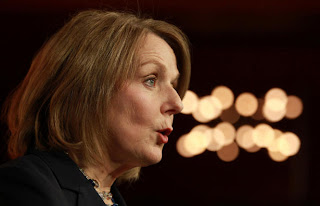Toronto Star
Dec 02 2011
 |
| Peggy Nash |
Still, Canada’s official Opposition is coming to the topic nervously. On the eve of the NDP’s major leadership debate over economic policy, only two of nine candidates — Toronto MP Peggy Nash and former party president Brian Topp — have tried to articulate a broad view.
Their differences are subtle. But the pair probably does represent the very narrow range of opinion that promises to dominate this leadership contest.
For Topp, the economy itself is best handled through the market. That marketplace, as he writes in one of his on-line position papers, may need to be regulated — as the stock exchange is.
As well, certain endeavours — such as health care, education and the environment — are too important to be left to the market alone.
But by and large, government should leave economic activity to the private sector. Instead, it should concentrate on sound tax policy and the use of social programs to compensate for the gross inequalities of income that unalloyed market forces create.
Alleviating inequality, under the Topp view, is not only a moral imperative. It is a practical one aimed at keeping health-care costs down, reducing crime and ensuring that all — including the rich — are more secure.
His is a classically orthodox NDP position. It was that of Ed Broadbent, when he was federal NDP leader in the 1970s and ’80s (Broadbent supports Topp).
It was also that of Bob Rae, now interim Liberal leader, when he was NDP premier of Ontario in the ’90s.
But because it is focused on redistributing the fruits of the marketplace, it has little to say about the nature of markets themselves.
Nash, by contrast, begins with a critique of free markets. In essence, she argues that they don’t work.
She notes that free trade deals, corporate tax breaks and privatization — the staples of the modern market approach — have not produced a more vibrant economy. Instead, they have led to one in which, for most people, incomes have stalled, jobs have become more insecure and Canada has reverted to its role as an exporter of raw materials.
 |
| Brian Topp |
What would she do instead? Nash’s solutions are hardly extreme. There’s no talk of nationalizing the banks.
But she argues that other countries (she cites South Korea, Finland, Brazil and Germany) have been able to use government to nudge private corporations in the correct economic direction.
If Topp’s views reflect the NDP orthodoxy of the ’70s and ’80s, Nash’s are influenced by the left nationalism of the same period.
She talks of using the government’s fiscal clout to leverage more Canadian content, legislating strict controls over foreign investment to ensure that Canadian jobs aren’t destroyed, and making efforts to “reverse Canada’s de-industrialization, diversify our economy and boost our productivity.”
It should come as no surprise that her supporters include Mel Watkins, one of the gurus of the left-nationalist movement.
Other NDP leadership candidates who will take part in Sunday’s debate have also talked of the economy. Ottawa MP Paul Dewar, for instance, has a list of measures that he says would create jobs.
But, so far, only Topp and Nash have tried to address the more fundamental questions:
What does it mean in 2011 to talk of socialist economics? Does it mean anything?
No comments:
Post a Comment